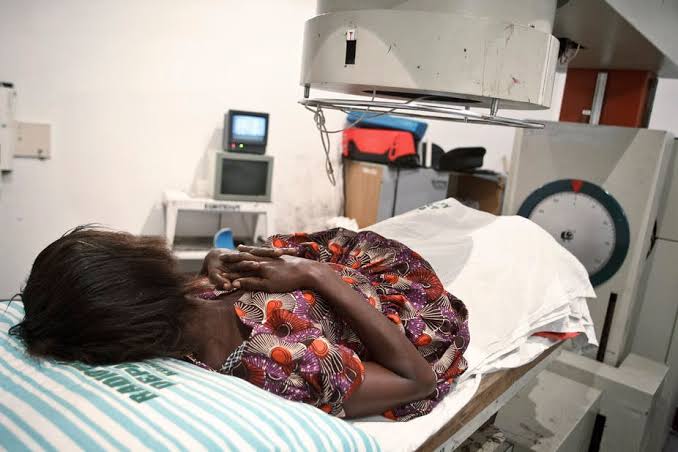News
Nigeria has only 14 radiotherapy centres for cancer patients, NNRA DG laments

With the rate cancer patients are dying in Nigeria due to inadequate treatment facilities, the Director-General of the
Nigerian Nuclear Regulatory Authority (NNRA), Dr. Yau Idris, has lamented the fact that the country currently has only 14 functioning cancer radiotherapy centres to serve its over 200 million population.
Radiotherapy is a type of cancer treatment that uses beams of intense energy to kill cancer cells and has the capacity to reduce the chance of cancer regrowth or help relieve symptoms. But according to the NNRA DG, the lack of adequate and functional centres in the country is responsible for the high rate of deaths recorded, with an estimated 78,000 Nigerians dying due to cancer-related ailments in the last three years.
Dr. Idris who raised the alarm on Monday during this year’s World Cancer Day symposium with the theme ‘Economy, Tax and Cancer Control: The Exit of Pharmaceutical Companies from Nigeria,’ organised by Project Pink Blue in Abuja, said it was disheartening for a country the size of Nigeria to have just 14 radiotherapy centres across the country.
“Really, we have serious problems. We have nothing to celebrate today but to lament. Looking at the case of Nigeria, we have only 14 radiotherapy centres in the country, nine of them belong to the government, only five of them belong to private, and only six of them are licensed by the Nigerian Nuclear Regulatory Authority, which means the others are not safe,” the DG said.
“In terms of equipment, Nigeria has only seven Linacs (Linear accelerators), for a population of 200 million people. South Africa has 92, and Egypt has 76.
“Even the 14 radiotherapy centres we have are not functioning, because today, they are functioning, tomorrow they are not functioning.”
Radiotherapy is a type of cancer treatment that uses beams of intense energy to kill cancer cells. It may also reduce the chance of cancer regrowth or help relieve symptoms.
The World Health Organisation said over 50 per cent of cancer patients require radiotherapy as part of cancer care, and it is frequently used to treat the most common types, such as breast, cervical, colorectal and lung cancer.
According to the National Institute for Cancer Research and Treatment, over 120,000 new cancer cases are recorded yearly in Nigeria, and an estimated 78,000 Nigerians died in 2020, due to cancer-related complications.
Speaking further, the NNRA boss said there is no functional gamma camera in the country.
The gamma camera is an imaging technique used to carry out functional scans of the brain, thyroid, lungs, liver, gallbladder, kidneys, and skeleton.
READ ALSO:Hope for cancer victims, as Nigerian govt says treatment to be covered in Health insurance scheme
“If you go to the Nuclear Medicine, we have only two Nuclear Medicine centres that have gamma cameras and both of them are down at the National Hospital, Abuja, and the University College Hospital, Ibadan.
“Virtually, there’s no gamma camera in Nigeria that is working, whereas a country like Tunisia with a population of twenty-something million has about 14 of them working.”
Meanwhile, the Minister of State for Health and Social Welfare, Dr. Tunji Alausa, said the Federal Government has concluded plans to build six new cancer centres across the six geopolitical zones in the country.
Alausa noted that the government is proactive in actions to address the cancer burden on the country.
Alausa said, “The government has concluded plans to build six new cancer centres across each of the six geopolitical zones in our country.
“The cancer centres will be built at the University of Nigeria Teaching Hospital, Enugu; Amadu Bello University Teaching Hospital, Zaira; Federal Tertiary Hospital, Katsina; University of Benin Teaching Hospital, Benin; University of Jos Teaching Hospital, Jos; and the Lagos University Teaching Hospital, Lagos.”
He noted that the Federal Ministry of Health and Social Welfare was able to secure additional funds to the N20bn appropriated three years ago for the building of the cancer centres.
“The amount that was appropriated has depreciated, there was no way we could use the N20bn to build the cancer centres. We had to make a presentation to the President and the National Assembly to give us another budget allocation to build the six cancer centres.
“We have gotten the additional funding that we need. The groundbreaking will happen in the next several weeks,” he said.
He added that there are increased collaborations with various pharmaceutical companies to review the cost of chemotherapy with some international non-governmental organisations, such as the Clinton Health Access Initiative, the American Cancer Society, Pfizer, Roche, and Johnson & Johnson.
“These pharmaceutical companies are providing 50 per cent discount in some of our cancer chemotherapy,” he stated.
Join the conversation
Support Ripples Nigeria, hold up solutions journalism
Balanced, fearless journalism driven by data comes at huge financial costs.
As a media platform, we hold leadership accountable and will not trade the right to press freedom and free speech for a piece of cake.
If you like what we do, and are ready to uphold solutions journalism, kindly donate to the Ripples Nigeria cause.
Your support would help to ensure that citizens and institutions continue to have free access to credible and reliable information for societal development.












